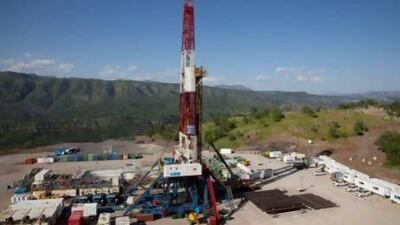Abu Dhabi National Energy Company wants to grow its regional oil and gas footprint by drawing on expertise gained at its operations in North America and Europe.
The government-controlled company, known as Taqa, operates oilfields in the United Kingdom's North Sea and produces oil and gas in Canada.
Taqa last year added BP's UK offshore oil assets to these "foundation businesses", and regards them as the platform for growth in the Middle East and North Africa (Mena) region.
"There are capabilities we want to build up in these businesses. To develop these capabilities to translate into the Mena region is a bit of the goal," said David Cook, Taqa's head of global oil and gas. "We would like to see more and more of our investments [going into] Mena."
Taqa's first move into the region's oil and gas sector was buying a majority stake in the Atrush block in the Kurdish region of Iraq at the beginning of the year.
The field development plan for Atrush was submitted to the Kurdish Regional Government (KRG) last week, and the block could move into the production phase within five months, said Mr Cook.
Leo Koot, who ran the company's UK subsidiary, Taqa Bratani, has been appointed to head the Iraqi operations.
Taqa also owns a stake in a power plant in Kurdish Iraq, and Mr Cook sees opportunities in gathering and transporting gas from fields in the region and feed to the power generation sector, as well as in export infrastructure.
The Kurds are striving to build pipelines that will enable them to export their oil and gas directly to Turkey, as a long-running dispute with the central government has led to Baghdad withholding the bulk of the payments owed to oil producers in the autonomous region.
"I am very interested in midstream infrastructure. Whether it's gas infrastructure inside Kurdistan, or oil infrastructure that goes all the way through Turkey and the Bosphorus," said Mr Cook. He is optimistic that Baghdad's policy of blacklisting companies active in Kurdish Iraq will not prevent Taqa from moving into Iraq proper.
"We can easily work in both," said Mr Cook.
The company is already in discussions with oil producers there to gather associated gas from oilfields, with the aim of using the gas to generate electricity.
The company is keen to develop a portfolio in Iraq that spans from upstream to downstream, and that can be replicated across the region and diversify Taqa's assets further.
The company's strategy is to "have enough of a portfolio to have a portfolio effect", said Mr Cook. "One of our objectives over time is to intelligently create a portfolio that allows us to manage the ups and downs of the commodity world."
Majority-owned by Abu Dhabi Water and Electricity Authority, Taqa is already familiar with power generation, as it owns a majority in Abu Dhabi's power plants.
It also holds power assets in several countries.
In Ghana, where Taqa is expanding the capacity of a small plant in the country's oil capital, Takoradi, the company is looking to move into gas processing.

